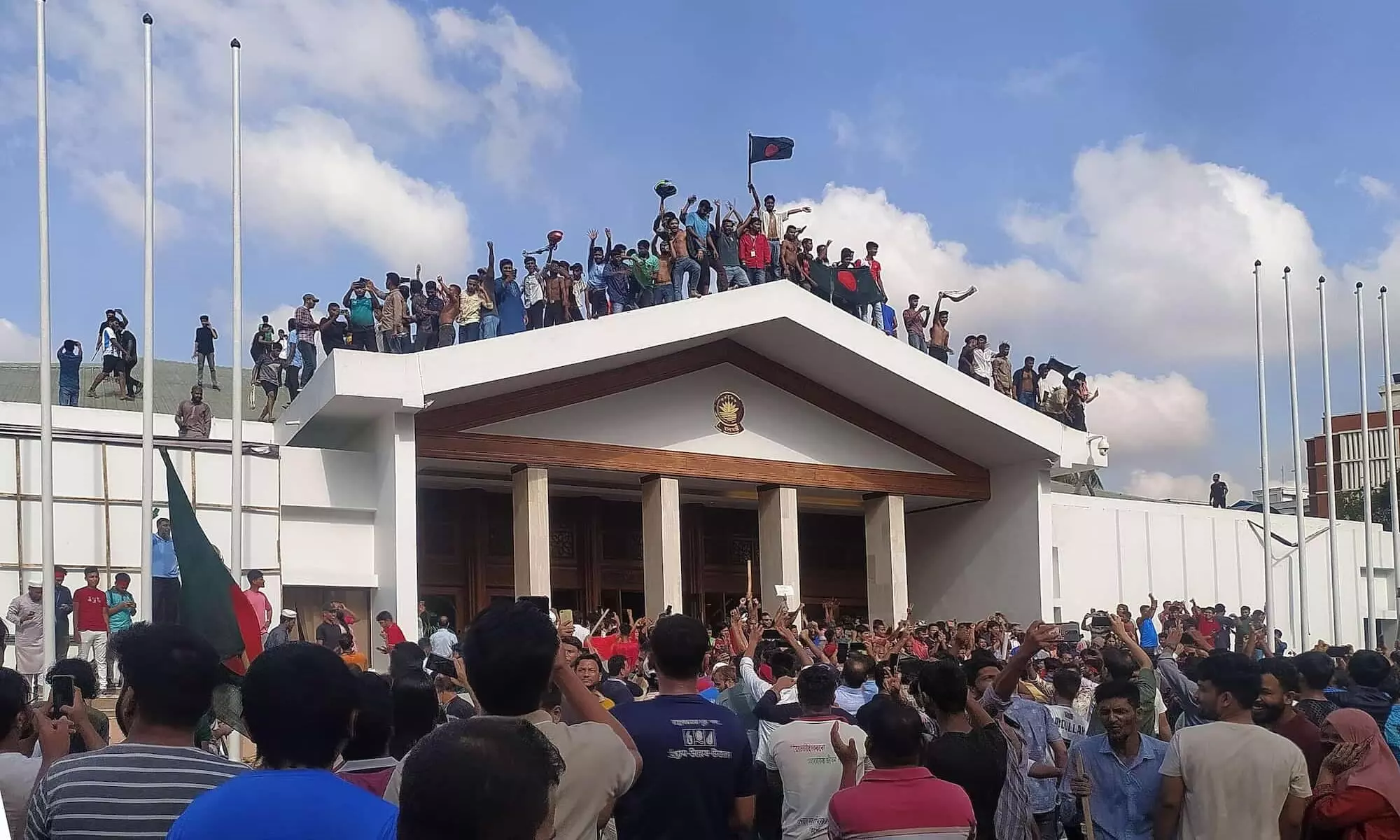
Bangladesh turmoil causes major disruptions in logistics: Freightos
Cancelled flights of the last few days have caused significant backlog for air cargo shipments in and out of Bangladesh

People in front of Prime Minister's office after Sheikh Hasina's resignation. (Photo Credit: Wikimedia/Md Joni Hossain)
Recent political turmoil in Bangladesh has significantly impacted logistics across the country.
"Our latest update on the situation in Bangladesh is that curfews and commercial closings – including of the important garment manufacturing sector – continue today as the army seeks to establish calm and safety, by keeping people off the streets following the recent looting and violence," says Judah Levine, Head of Research, Freightos.
In terms of logistics impacts, cross-border and inland rail remains suspended, he added. "The major Petrapole crossing to and from India is open to individuals but closed to traffic, including trucking which has created a backlog of more than 700 trucks on the Bangladesh side.
"The Dhaka Airport, Bangladesh’s air cargo hub, had closed for six hours on Monday but reopened on Tuesday. Indian carriers like Air India and IndiGo had suspended all flights and many other flights were cancelled as well through much of Tuesday but many flights, including by Indian carriers, resumed by Tuesday evening.
"Our forwarder partners in the region report that the many cancelled flights of the last few days have caused a significant backlog for air cargo shipments in and out of the country that will take time to clear. Disruptions to road and rail are likely also complicating delivery and pick up from airports."
The Port of Chittagong was completely closed earlier in the week, according to carrier updates. As of Tuesday it was operating but well below capacity, Levin added. "With inland rail suspended and trucking disrupted, only a few hundred containers reportedly arrived Tuesday compared to the more typical volume of 4,000 TEU. While 2,500 TEU were imported and 1,300 exported yesterday, more than 40,000 TEU are sitting in the container yard for an 80 percent utilisation."
The Freightos Terminal data shows that export ocean container rates have been climbing since the disruptions began in June. “Rates to the U.S. are now over 40 percent higher than two months ago, reaching about $8,650 per 40’ container. Rates from Chittagong to Rotterdam have increased nearly 170 percent to approximately $7,000 per container,” says Levine.
Continued backlogs and delays will mean shippers will face additional storage costs for waiting containers and could lead to more rate increases, with some carriers already announcing mid-month increases.
Sudhir Sekhri, Chairman, Apparel Export Promotion Council (AEPC) says: “Buyers are very concerned with the escalation of the civil unrest in Bangladesh. In the short term, fast fashion buyers have no option but to pull out their orders from Bangladesh and place them elsewhere.”
Most of these orders are in man-made fabrics, purchased from buyer nominated sources in China, Korea and even Europe, Sekhri added. "Shifting these short-delivery orders using special imported fabrics to India is not viable, given India’s current import policies. Only orders in fabrics of Indian origin are expected to be shifted to Indian factories."
For the long term, buyers will remain sceptical of being overly dependent on Bangladesh. "Even before the current turmoil in Bangladesh, buyers were already looking for capacities elsewhere due to capacity saturation in Bangladesh. The recent turmoil will expedite their plans. Indian factories will get a piece of the cake only if they ramp up capacities. However, buyers will continue to be hesitant to place their orders in India unless the government of India tweaks its import policies to allow greater and easier access to imported man- made fabrics, trims and accessories.”
Ashwani Kumar, President, Federation of Indian Export Organisations (FIEO) says trade has come to a near-complete halt though occasional disruptions were witnessed in the last 15 days.
"The feedback given by importers in Bangladesh is reassuring as they expect the situation to normalise in a week or so. The export of perishables may feel the heat while the rest of the commodities will catch up once trade resumes.
"India’s exports to Bangladesh stood at $11 billion in 2023-24 consisting of cotton, petro products, automobile & auto components, yarn & fabric, cereals, fruits & vegetables, tea, coffee, spices and animal feed. Import is dominated by apparel, textiles, leather goods, animal feed and fish."

